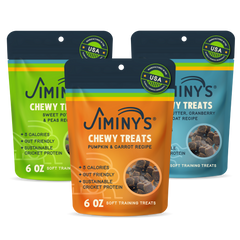You should pick up your dog’s poop no matter where you are — yes, even in the woods. Here’s why:
Dog poop is not the same as wildlife poop. Local wildlife eat only plants/animals local to their environment (a circular ecosystem).
But dogs don’t (no matter how natural your dog’s diet is). So when they poop, it introduces new elements and bacteria not naturally found in the local ecosystem.
For example, modern dog food and recipes are rich in the nutrients domestic dogs need for a complete diet. This often leads to excess nitrogen and phosphorous in their poop.
That nitrogen and phosphorous can create an inviting habitat for invasive weeds, cause algae blooms in local waterways, and slowly kill off local plant and aquatic life.
It can even get into our oceans or drinking water, and make people sick. According to the FDA, as few as 100 dogs (yes, only 100) living near the ocean can produce enough waste in only 2-3 days to shut down 20 miles of a bay and watershed for swimming and shellfishing.
Other studies have found that 20% of the bacteria contaminating waterways can be traced back to the digestive system of dogs.
If you’re thinking, “It’s just one little poop. It won’t make a difference,” consider the fact that thousands of others are likely thinking the same thing.
One study from the Leave No Trace Center for Outdoor Ethics showed that only about 73% of dog owners picked up their pets’ waste in one popular hiking area in Colorado (5.3 million visitors each year). That's around 60,000 pounds of dog poop left to decompose in nature.
Plus, no one wants to step in your dog’s poop.
So, while it might seem easiest to just toss a poo in the leaves where you think no one will walk, don't do it.
Just pick up the poop, put it in a nice compostable bag, and stick it in the garbage. It’s not a perfect solution when it comes to sustainability, but when it comes to environmentalism, it’s the best we’re gonna get.
Because the only thing that stinks worse than dog poop is when that dog poop ruins our environment.
While you're at it, might as well be more sustainable with our insect-based dog treats.
FAQ about Dog Poop in the Forest
1. Do I have to pick up my dog’s poop in a forest or on a trail?
Yes — you should pick up your dog’s poop wherever you take them, even in forests, hiking trails, or backcountry areas. Leaving it behind can harm the environment and spread bacteria because dog waste isn’t the same as wildlife poop.
2. Why isn’t dog poop in the woods just “natural”?
Unlike wild animals — whose poop is part of a local ecosystem loop — dog poop often contains nutrients and bacteria from commercial dog foods that aren’t part of the natural nutrient cycles. This can disrupt soil and plant life, contribute to harmful algae growth in waterways, and introduce pathogens.
3. Does dog poop harm the environment?
Yes. Dog waste can release nitrogen and phosphorus that encourage algae blooms in lakes and rivers, reduce water quality, and harm aquatic life. It can also introduce harmful bacteria and parasites into soil and water.
4. Can dog poop spread disease in forests?
Yes — dog feces can carry pathogens like E. coli, Salmonella, roundworms, and other parasites that pose health risks to people, pets, and wildlife if left unattended.
5. What should I do with my dog’s poop if I’m in the forest?
Carry dog poop bags with you — biodegradable if possible — and pack the waste out to trash or a designated dog-waste receptacle when you leave. This follows the Leave No Trace principle of “pack it in, pack it out.”
6. Are there ways to carry poop on long hikes?
Yes — many hikers bring sturdy containers or odor-resistant bags designed for backcountry use so the waste doesn’t smell or leak during the hike. Some outdoor gear brands even offer specialized “wag bags” for remote trips.
7. What if I “just leave it off the trail”?
Even if you put the waste off the trail or behind a bush, it still affects the environment and other visitors. It can wash into waterways, attract insects, or be stepped on by another hiker. Packing it out is the responsible choice.
8. Are there legal rules about dog poop in forests and parks?
Many parks, trails, and municipalities have regulations requiring dog owners to pick up and properly dispose of pet waste. Fines for non-compliance can apply in some areas. Regardless of specific laws, following proper disposal practices helps keep public lands clean and accessible.
9. How does picking up poop help other hikers?
Picking up dog waste preserves the experience for everyone by keeping trails clean and free of unpleasant sights and smells. It also respects the shared nature of public lands and encourages continued dog-friendly access.
10. What’s the best philosophy for pet owners in nature?
Follow the Leave No Trace principles: pack out all pet waste, minimize your impact, and leave outdoor spaces as you found them — so others, wildlife, and future generations can enjoy them too.





